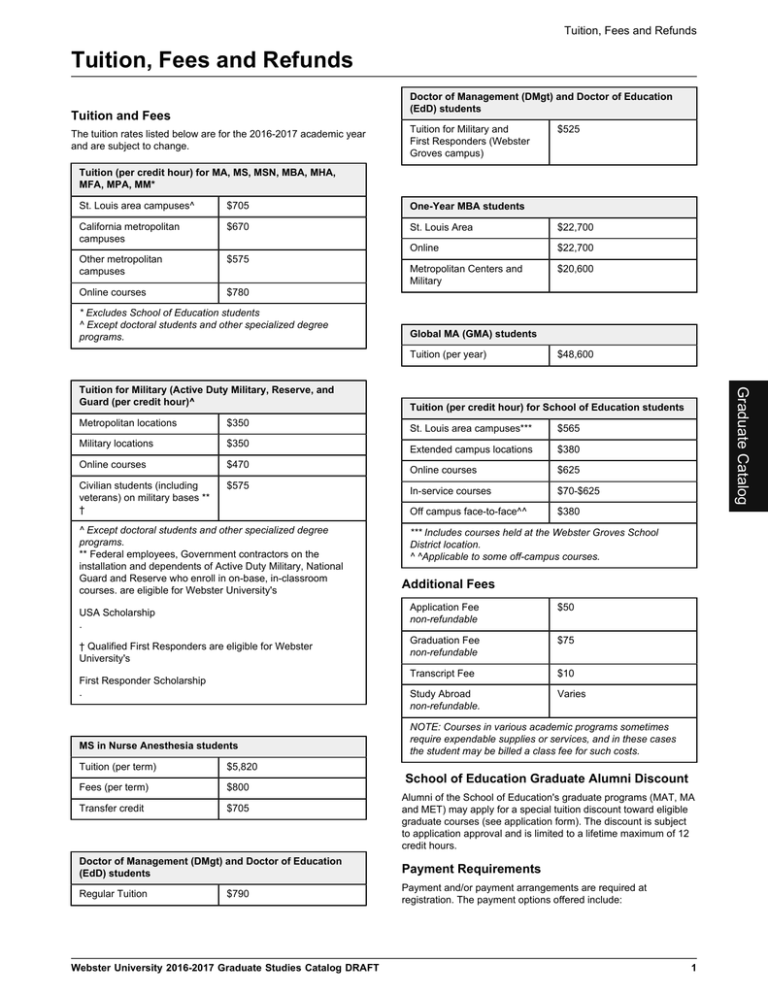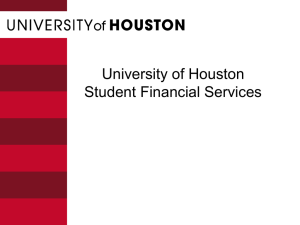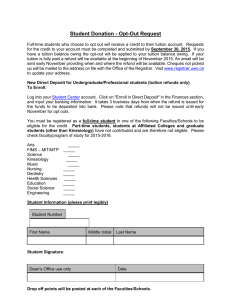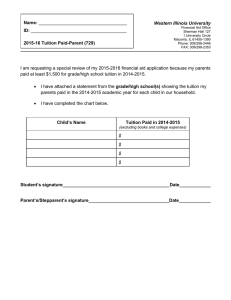Tuition, Fees and Refunds Tuition and Fees
advertisement

Tuition, Fees and Refunds Tuition, Fees and Refunds Doctor of Management (DMgt) and Doctor of Education (EdD) students Tuition and Fees The tuition rates listed below are for the 2016-2017 academic year and are subject to change. Tuition for Military and First Responders (Webster Groves campus) $525 Tuition (per credit hour) for MA, MS, MSN, MBA, MHA, MFA, MPA, MM* St. Louis area campuses^ $705 One-Year MBA students California metropolitan campuses $670 St. Louis Area $22,700 Online $22,700 Other metropolitan campuses $575 Metropolitan Centers and Military $20,600 Online courses $780 * Excludes School of Education students ^ Except doctoral students and other specialized degree programs. Global MA (GMA) students Tuition (per year) Metropolitan locations $350 Military locations $350 Online courses $470 Civilian students (including veterans) on military bases ** † $575 ^ Except doctoral students and other specialized degree programs. ** Federal employees, Government contractors on the installation and dependents of Active Duty Military, National Guard and Reserve who enroll in on-base, in-classroom courses. are eligible for Webster University's USA Scholarship . † Qualified First Responders are eligible for Webster University's First Responder Scholarship . MS in Nurse Anesthesia students Tuition (per term) $5,820 Fees (per term) $800 Transfer credit $705 Tuition (per credit hour) for School of Education students St. Louis area campuses*** $565 Extended campus locations $380 Online courses $625 In-service courses $70-$625 Off campus face-to-face^^ $380 *** Includes courses held at the Webster Groves School District location. ^ ^Applicable to some off-campus courses. Additional Fees Application Fee non-refundable $50 Graduation Fee non-refundable $75 Transcript Fee $10 Study Abroad non-refundable. Varies NOTE: Courses in various academic programs sometimes require expendable supplies or services, and in these cases the student may be billed a class fee for such costs. School of Education Graduate Alumni Discount Alumni of the School of Education's graduate programs (MAT, MA and MET) may apply for a special tuition discount toward eligible graduate courses (see application form). The discount is subject to application approval and is limited to a lifetime maximum of 12 credit hours. Doctor of Management (DMgt) and Doctor of Education (EdD) students Payment Requirements Regular Tuition Payment and/or payment arrangements are required at registration. The payment options offered include: $790 Webster University 2016-2017 Graduate Studies Catalog DRAFT Graduate Catalog Tuition for Military (Active Duty Military, Reserve, and Guard (per credit hour)^ $48,600 1 Tuition, Fees and Refunds Tuition, Fees and Refunds • Financial aid • Direct billing to a third party (i.e., employer) • Tuition assistance paid by a government agency, e.g., military • Deferred payment plan • Payment in full Some options require the submission of appropriate documentation. The deferred payment plan option requires a deferred payment fee to be paid at the time of registration. The University reserves the right to refuse deferred payment privileges for any student whose account is overdue or has been overdue in the past. Students are encouraged to make electronic check payments online, but personal checks made payable to Webster University are also accepted. A $30 returned payment fee is charged if payment is returned. Webster also accepts MasterCard, Discover, VISA, and American Express payments online with a 2.75% convenience fee. Students are financially responsible for all courses not officially dropped by the deadline. Webster University reserves the right to withhold transcripts or diplomas, and refuse or cancel enrollment for future terms, if any tuition or other fees or charges owed to the University are not paid when due. In the event an account is referred to an agency or attorney for collection, the student promises to pay, in addition to all amounts otherwise due to Webster University, the costs and expenses of such collection and/or representation not to exceed 33-1/3% of the amount owed, including, without limitation, reasonable attorneys' fees and expenses (whether or not litigation is commenced), to the extent permitted by applicable law. Refunds Graduate tuition refunds depend on the drop or withdrawal date. It is the graduate student's responsibility to file the drop or withdrawal form(s) with his/her advisor by the deadline. Refunds are for tuition only; course and laboratory fees are non-refundable. Tuition refunds for dropped courses are automatic and charges are expunged from the student's account. The student tuition refund rates apply when a student drops or withdraws from a course in accordance with University enrollment policies and the refund has been approved. Tuition refunds for withdrawals are made automatically, based on the date of withdrawal, as authorized by the University official who signs the withdrawal form. Refunds shall be made within 30 days of the date that the institution has determined that a refund is due to a student. Students attending on-campus classes in California will receive a pro rata refund of tuition if the withdrawal is within 60 percent of the beginning of the enrollment period. Students attending oncampus classes in Georgia are eligible for a 50% refund from Week 3 through Week 5. All other student refunds/tuition waivers, including those for online courses, are made according to the following schedule: Drop: Withdrawal: 2 Date 16-Week Class 8- or 9Week Class Week 1 100% 100% Week 2 100% 100% Week 3 50% 50% Week 4 50% 25% Week 5 25% 0% Week 6 25% 0% Week 7 25% N/A Week 8 25% N/A Week 9 0% N/A The deposit and refund policies at our European and Asian campuses may differ from the above. Please refer to the catalog of the international campus you are attending for details. Late Refund Request In cases where the student does not qualify for a refund of tuition per the established refund schedule, she/he may petition for an exception due to special circumstances. The student must file a tuition adjustment form with the Academic Advising Office (www.webster.edu/advising) and attach a letter of explanation of special circumstances and appropriate supporting documentation. A student may file a tuition refund appeal for one of the following conditions: medical, immediate family emergency (e.g. death, severe illness), or other extenuating personal/ professional circumstance (e.g. job loss, separation/divorce). The documentation could include a dated doctor's verification letter of medical treatment and diagnosis, military orders, death certificate or obituary notice, legal documents, or dated supervisor's letter on company letterhead stating withdrawal from course(s) is work related. Tuition refunds, limited to one per student per degree barring no extraordinary circumstance, must be submitted within one term following the end of the course of a tuition refund appeal due to a withdrawal from a course. Once received, the appeal will be reviewed by the Graduate Tuition Refund Appeal Committee. The committee reserves the right to request additional information from the student, the instructor, the academic advisor, or the college or school of record. The committee will also obtain course activity for all online students. The process usually takes 4-6 weeks, assuming no additional information is required to hear the request. Students will be notified via email regarding the decision of the Graduate Tuition Refund Committee. The decision of the committee will be final. Financial Aid Webster University's Financial Aid Office offers a comprehensive program of financial aid resources for students needing supplemental financial support for their educational expenses. To apply for federal, state, and institutional aid, a student must complete a Free Application for Federal Student Aid (FAFSA). The FAFSA can be accessed on-line at www.fafsa.gov. Webster University's award year begins in the summer semester and ends in the following year spring semester (Summer, Fall, Spring). To be considered for priority financial aid awarding, the FAFSA should be submitted by March 1. Students may complete the FAFSA through June 30 of the award year; however, this may result in limited aid eligibility. In addition to the annual FAFSA, a student needs to complete and submit the Webster University Financial Aid Application available on-line at www.webster.edu/ financialaid/forms. Cost of Attendance An important part of determining a student's eligibility for financial aid is calculating a Cost of Attendance. In accordance with federal regulations, Webster University has developed a Cost of Attendance (i.e., budget) for anticipated expenses a student may incur during the current school year. These expenses include Webster University 2016-2017 Graduate Studies Catalog DRAFT Tuition, Fees and Refunds Tuition, Fees and Refunds tuition, room, board, books and supplies, travel and personal. Room and board can refer to either on campus or off-campus living expenses, depending upon a student's response on the FAFSA. Expenses are also considered for students who live at home with parents or relatives. Travel expenses include items such as gasoline, vehicle maintenance and insurance. Personal expenses include laundry, clothing and entertainment. Many of the elements in the Cost of Attendance are estimates, so it is possible for a student to spend more or less than anticipated during any given year. Federal Financial Aid Student Eligibility To be eligible for federal financial aid, also referred to as Title IV funds, a student should: Gift Aid Scholarships awarded directly to the student from outside sources are added to the award, becoming part of the total package of aid. The amount of the private award can impact eligibility in other programs as can the criteria of the program itself. It is important for all students to provide information regarding, the selection and renewal (if applicable) criteria, the amount and anticipated disbursement date for any outside scholarship or grant awarded to them to the Financial Aid Office as soon as possible to insure any impact on other aid or charges can be determined. Self-Help Aid Student loans (repaid with interest after leaving the University) may reduce both direct (tuition, fees, campus residence, books) and indirect costs (living expenses, transportation, day care). Federal loans allow students to defer payment until after leaving the University or dropping below half-time student status. There are also privately funded alternative loan programs designed to supplement institutionally administered Federal loan programs. These are not federally insured and may or may not carry a higher, variable interest rate, may require a credit worthy cosigner with a favorable credit history. For students working on a graduate degree, the only available aid are the federal and private loan programs. There are maximum allowable loan levels from the Federal Stafford Direct Student Webster University 2016-2017 Graduate Studies Catalog DRAFT Satisfactory Academic Progress According to the United States Department of Education regulations, all students applying for federal and/or state financial assistance must maintain satisfactory progress in their course of study to receive these funds. These standards stipulate, but are not limited to, maintaining acceptable grades, completing a sufficient number of credit hours per semester, and completing a degree within a reasonable time frame. A student who does not meet these standards is not eligible to receive federal, state, and/or institutional financial aid. All semesters of attendance are considered for satisfactory progress regardless of whether the student received aid. Adherence to the following standards will be necessary for continued financial aid eligibility. A student must be making academic progress regardless of whether the student had previously received aid. Before aid is disbursed, a student's progress will be evaluated annually after spring semester grades are recorded. Any student who has not previously received financial aid may not be notified of their status until they apply for financial aid. Satisfactory Academic Progress is determined by: • Qualitative Measurement (GPA) • Students must maintain a 2.0 cumulative grade point average based upon institutional hours attempted to remain in good standing. • Quantitative Measurement: Pace of Progression (Credit Hours) Students must complete attempted hours according to the following: • Completion of 67% of cumulative hours attempted (i.e., a student attempts 15 hours; he/she must complete 10). • Course grades of "I", "WF", "W", or "F" are considered as attempted and not completed. • Courses completed at Webster University, as well as courses transferred and accepted by Webster University are considered in the Pace of Progression completion rate. • Once a student completes the coursework for a class in which they had previously earned a grade of "I", they must notify the Financial Aid Office of the completion and the financial aid status will be reviewed and updated. Maximum Time-Frame Degree requirements must be completed within a specific time frame. The maximum time frame for a Graduate Degree at Webster University is 150% of required credit hours (i.e., 36 credit hours x 150% = 54 credit hours) to complete the degree including hours transferred and accepted by Webster are considered in this time frame. Any student who has exceeded the maximum time frame and/or who mathematically cannot finish the program within this period will be considered ineligible for financial aid. Webster University understands students may change their educational goals and programs of study. These students may appeal for reevaluation of their status. Satisfactory Academic Progress Monitoring Students are reviewed for Qualitative Measurement, Pace of Progression, and Maximum Time-Frame annually at the end of each Spring semester. Students who are on academic plan 3 Graduate Catalog • be a U.S. citizen or an eligible noncitizen; • have a valid Social Security number (with the exception of students from the Republic of the Marshall Islands, Federated States of Micronesia, or the Republic of Palau) • be registered with Selective Service, if you're a male (you must register between the ages of 18 and 25) • be enrolled or accepted for enrollment as a regular student in an eligible degree or certificate program • be enrolled at least half-time to be eligible for Direct Loan Program funds • maintain satisfactory academic progress in college or career school • sign statements on the Free Application for Federal Student Aid (FAFSA) stating that: • you are not in default on a federal student loan and do not owe money on a federal student grant • you will use federal student aid only for educational purposes • show you're qualified to obtain a college or career school education by • having a high school diploma or a recognized equivalent such as a General Educational Development (GED) certificate or • completing a high school education in a homeschool setting approved under state law. Loan Programs for required graduate course work to complete the degree. Any money borrowed for prior degree(s) would be deducted from the ceiling to determine loan funds still available. Students will receive notification of funding eligibility per year and the criteria to receive and maintain that funding. Tuition, Fees and Refunds Tuition, Fees and Refunds probation will be evaluated at the end of each semester (Summer, Fall, Spring). such notification does not relieve the student of the requirement to read, understand and follow the Satisfactory Academic Progress Requirements for Financial Aid Recipients. Suspension/Academic Plan Probation Status A student will be placed on Financial Aid Suspension if: • The cumulative GPA is less than the stated requirement in the Qualitative Measurement section. University Withdrawal If a student fully withdraws from the university, the Bursar Office may adjust their charges based upon their withdrawal date and the Webster University Refund Policy. For the university refund policy, refer to the University Business Office website. And/or • The student has not successfully completed the minimum 67% of attempted hours including transferred hours. A student placed on financial aid suspension will lose eligibility to receive financial assistance. Students will receive a notice in writing of their suspension status from the Financial Aid Office. Non-Satisfactory Progress Appeal A student who has been suspended from financial aid may complete and submit a Non-Satisfactory Progress Appeal Form (Available online or in the Financial Aid Office) for reinstatement within thirty (30) days of notification, if there are extenuating or mitigating circumstances contributing to their inability to meet the requirements. Students may appeal for one of the following reasons: • The death of a relative to the student. • Severe injury or illness of the student. • Other extenuating circumstances which may include but are not limited to: • Severe illness of a relative for whom the student has custodial responsibility. • Emergency situations such as fire or flood. • Military reassignment, required job shift change, or job transfer preventing the student from completing a semester • Separation or divorce Such an appeal must be accompanied by supporting documents and be submitted to the Financial Aid Office who will forward the appeal to the Satisfactory Academic Progress Committee. A student placed on a Financial Aid Academic Plan Probation: • Will be reviewed at the end of each semester for continued eligibility. • Must achieve a Qualitative Measurement (GPA listed above) and Pace of Progression (67% of attempted hours completed) each semester. • Will lose all financial aid eligibility in future semesters and be placed on Financial Aid Suspension if either or both measurements are not achieved with no opportunity for appeal Reinstatement A student who has been Suspended from financial aid for academic reasons and has not had an appeal accepted may be eligible for reinstatement if they enroll in courses at their own expense and meets the criteria listed for cumulative Satisfactory Academic Progress. Students must notify the Office of Financial Aid by submitting another Non-Satisfactory Progress Appeal Form. Regardless of any adjustment to a student's charges, if he or she fully withdraws from the university, financial aid may be adjusted based on the percentage of the semester completed before withdrawal. In some cases, Federal Return of Title IV Funds regulations may require that aid be returned to the federal government for students who withdraw from Webster University before 60 percent of a term has been completed. Financial aid is awarded for the entire term and if a student withdraws prior to the end of a term, then the Return of Title IV Fund rules will determine how much financial aid has been earned. The student can keep the earned amount for the term, but the unearned portion must be immediately returned to the federal government. In some situations, this will leave the student with a balance owed to the university. A student should contact the Financial Aid Office before withdrawing from a course or term to understand the effects this action may cause to financial aid eligibility. Graduate Assistantships A limited number of graduate assistantships are available. Assistantships may include a monthly stipend and tuition remission benefits. Please contact the office of your degree program for availability, remunerations, and application deadlines. Veterans' Educational Benefits Webster University degree and certificate programs are approved for veterans' educational benefits in compliance with prescribed regulations by special approval agencies in each state and for each foreign country where the University offers programs. Questions about eligibility can be directed to the Vets Success on Campus (VSOC) office. The regional VA office will be notified of the date on which a student officially ceases attendance if veterans' educational benefits apply. Except under extenuating circumstances, students receiving VA benefits who withdraw from a course will be reported to the VA offices as making unsatisfactory progress. Records of progress are kept by the institution on both veteran and non-veteran students. Progress records are furnished to all students at the end of each scheduled term. The policy and regulations regarding student standards of progress for graduation are detailed in the section titled Undergraduate Grading Policy. Additional information may be obtained from the Office of the Registrar at the St. Louis home campus. Any conduct that is detrimental to the school and/or other students will result in the termination of VA educational benefits. The Satisfactory Academic Progress Policy for financial aid also applies to VA educational benefits. The Webster University Financial Aid Office will attempt to notify, in writing, any student currently receiving financial aid who is placed on Financial Aid Suspension. However, failure to receive 4 Webster University 2016-2017 Graduate Studies Catalog DRAFT





